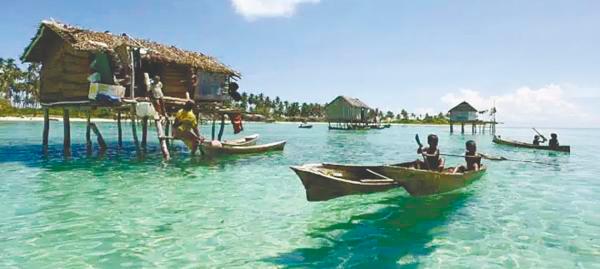THE forced evictions of the Bajau Laut community in Tun Sakaran Marine Park have spotlighted the complex balance between conservation efforts and the rights of indigenous people.
As homes were demolished and lives disrupted, the well-being of the Bajau Laut community was severely tested.
This incident underscores the urgent need for a more nuanced and inclusive approach to conservation, one that respects the environment and the people who have traditionally stewarded it.
Legacy of the sea
The Bajau Laut have a rich history deeply intertwined with the marine environments of Southeast Asia. Traditionally, they have lived a nomadic or semi-nomadic lifestyle, moving with the seasons and tides and relying on the ocean’s resources for sustenance and livelihood.
They are known for their expertise in diving and maritime navigation and ability to effectively and sustainably utilise marine resources.
Their unique way of life, characterised by boat-dwelling and a deep understanding of the marine ecosystem, has allowed them to thrive for generations in harmony with their natural surroundings.
Despite their critical role in the local marine economy, the Bajau Laut often face marginalisation, statelessness, lack of access to public services and social discrimination.
Environmental stewardship and challenges
As an environmental NGO, WWF-Malaysia focuses on the environmental aspects of this issue while also recognising the myriad socioeconomic factors that shape conservation success.
The Bajau Laut’s traditional practices often exemplify the sustainable use of marine resources. They possess extensive traditional knowledge about marine ecosystems, including the behaviours and habitats of various marine species. This knowledge is crucial for sustainable fishing practices and can be valuable for sustaining conservation efforts.
Despite their marginalised status, the Bajau Laut contribute to the local economy through their fishing activities. They engage in barter trade, exchanging fish and other marine products for essential goods such as rice, cassava and textiles.
The transition from barter trade to a cash economy has also seen them adapting to new economic practices, although they face numerous challenges in this regard.
A minority within the community has resorted to unsustainable practices such as fish bombing and indiscriminate fishing, driven by various socioeconomic pressures. These practices not only harm marine biodiversity but also threaten the resources that the Bajau Laut depend on.
This dichotomy within the community highlights the need for targeted interventions that promote sustainable practices while providing alternatives to harmful methods.
Pathways to sustainable coexistence
To address these challenges, a multi-faceted approach is required:
Recognition and support for sustainable practices: It is crucial to acknowledge and support the Bajau Laut to enhance sustainable fishing practices. Their understanding of the sea and marine life can be integrated into conservation strategies to protect marine biodiversity and manage marine protected and conserved areas effectively.
These individuals should be recognised as key partners in conservation efforts. This can be achieved through initiatives such as Locally Managed Marine Areas and Other Effective Area-based Conservation Measures, which empower local communities to manage their natural resources sustainably.
By ensuring their inclusion in decision-making processes, we can empower them to contribute to marine conservation. Their local ecological knowledge can be harnessed to enhance the sustainability of marine ecosystems in the region.
Involving the Bajau Laut in conservation initiatives not only acknowledges their historical and cultural ties to the sea but also promotes more effective and inclusive marine resource management.
Framework for sustainable use: The government should develop a comprehensive framework that accommodates the unique lifestyle of the Bajau Laut. This framework should integrate traditional ecological knowledge with scientific conservation techniques, ensuring that the community can continue their way of life while protecting the marine environment.
Intergovernmental collaboration: The Coral Triangle Initiative (CTI) provides an excellent model for intergovernmental collaboration. By fostering cooperation among the governments of Malaysia, Indonesia and the Philippines, the CTI aims to protect marine biodiversity while supporting the livelihoods of local communities. Such collaborative efforts can be instrumental in creating policies that are environmentally sound and culturally sensitive.
Mapping and monitoring: Implementing systems to map and track the sustainable use of marine resources by the Bajau Laut can provide valuable data for conservation planning. This approach can help identify and protect critical habitats while ensuring that the community’s needs are met.
World Wide Fund (WWF) for Nature-Malaysia emphasises the importance of Indigenous Peoples and Local Communities (IP&LC)-led solutions, such as Locally Marine Managed Areas within and beyond Marine Protected Areas.
We aim to understand and work within diverse contexts to strengthen community capacities and governance. This empowers communities to manage their resources sustainably while respecting their autonomy and cultural practices.
Conservation is most effective when guided by those living closest to these ecosystems, affirming that IP&LCs have the right to manage their territories and decide on the terms of any external involvement.
This article is contributed by WWF-Malaysia. Comments: letters@thesundaily.com









